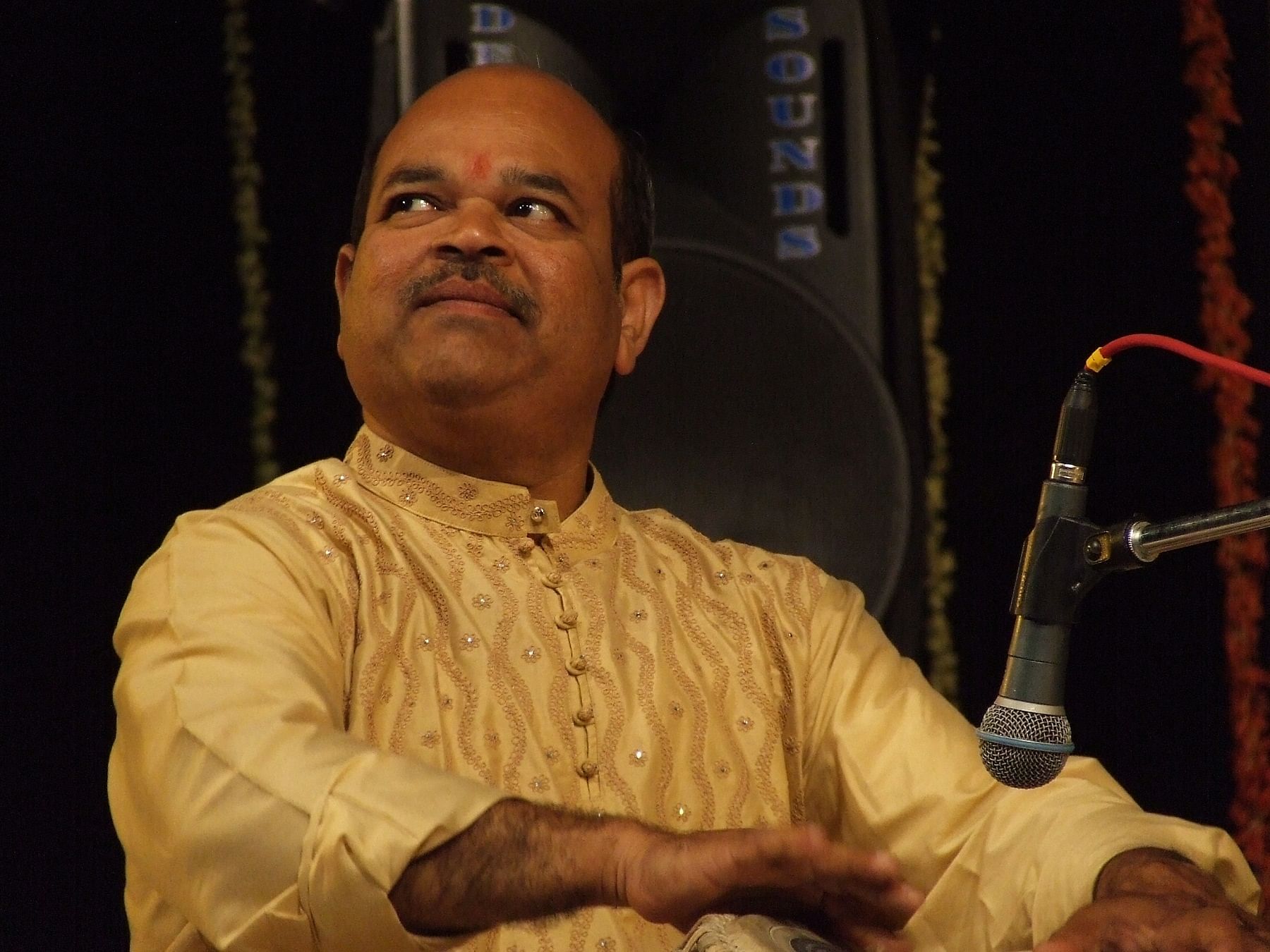
One cannot imagine the Hindustani musicscape of Karnataka without tabla maestro Pandit Ravindra Yavagal. He is yet another musical phenomenon from Dharwad, a city that has produced stalwarts such as Bhimsen Joshi, Mallikarjun Mansur and Gangubai Hanagal and, in more recent years, M Venkatesh Kumar.
Yavagal, a soft-spoken Kannadiga, is also a big presence on the national and international concert circuits. His tabla art has a distinct (gayaki) vocal aspect, with percussive expressions that bend and stretch like the human voice. Violinist Ranjan Beura shares how lehra accompanists (lehra is a basic melodic line played to enable rhythmic improvisation) find it difficult to match his rhythmic flow, punctuated by nuanced movement. Yavagal’s playing is characterised by superb clarity and a balanced tabla-dagga (right hand-left hand) power.
Ravindra began learning the tabla when he was just four from his father Ramachandra Yavagal. He continued under Veeranna Kamkar of Gayathri Gayana Shaala, Hubballi. He later received intense training as a disciple of Pandit Sheshagiri Hanagal. Yavagal was also mentored by Pandit Lalji Gokhale, disciple of the legendary Ustad Ahmed Jan Tirakhwa and his guru’s guru. At 10, he had already performed at the celebrated Sawai Gandharva Music Festival in Kundagol accompanied by the harmonium maestro Appa Jalgaonkar.
At 60, Yavagal has accompanied hundreds of vocalists and instrumentalists in India, big and small. Some of the most acclaimed musicians seek his accompaniment. He has unfailingly enriched their concerts with his sensitive playing. Because he got an early start, he has had the privilege of accompanying prime artistes spanning five generations.
A fine shehnai recital by Rudresh Bhajantri, accompanied by Gurumurthy Vaidya on the pakhawaj and Rupak Vaidya on the tabla, set the tone for Yavagal’s 60th birthday celebrations at the Gayana Samaja in Bengaluru on December 14 . Shanthabai, wife of his guru Pandit Sheshagiri Hanagal, and Baburao Hanagal, son of Gangubai Hanagal, were among the guests.
Sarod maestro Rajeev Taranath traced Yavagal’s growth from child prodigy to exemplary master. He placed Yavagal in the tradition of Ustad Alla Rakha and Ustad Zakir Hussain, with his playing characterised by solidity and constant exploration. In Taranath’s words, Yavagal engages in taqseem, the art of aesthetically spreading phrases within a rhythm-cycle.
Pandit Vinayak Torvi described Yavagal’s musical school as the Kallusakkare (candy) gharana, consistently sweet like his guru Sheshagiri Hanagal’s playing. Pandit Parameshwara Hegde admired Yavagal for executing his social responsibility with his meaningful teaching.
Vidwan Anoor Ananthakrishna Sharma, mridanga maestro, highlighted how Yavagal makes a delicate distinction between playing for an instrumentalist and a vocalist, and playing for a male vocalist and a female vocalist.
Samarpane, the large ensemble of Yavagal’s students that presented a piece on his birthday, spoke volumes about the rich proliferation of the tabla art in Karnataka.
As a song in raga Yaman unfolded gracefully a song in three voices, and was joined by the sitar, violin and santoor, the ensemble explored the ten-beat jhap taal. Unlike the 16-beat teen taal, jhap taal is not symmetrical and is hence more challenging. The presentation highlighted dramatic rhythmic flights, and was a grand composition.
Yavagal’s brilliant exposition of the slow-paced 16-beat teen taal was the finale. Admiring his guru’s sense of timing and the depth in his playing, Dr Udayraj Karpur said the performance was characterised by sophisticated improvisation. Yavagal’s masterly exposition took up traditional patterns, covered triplet patterns, and concluded in an exhilarating crescendo in 16-beat cycle.
Yavagal’s mother Parvathi Bai, besides his father, has been an important part of Ravindra’s life and learning. Sri Rama Kala Vedike, an organisation Yavagal has founded, is named after his late father. At 96, Parvathi Bai continues to inspire Ravindra’s music and organisational work. Yavagal’s personal world includes his mother, his supportive wife Suvarna, his talented sons Kiran (who plays the tabla) and Nayan (who sings), and a large family of focused disciples, some of whom are illustrious performers and teachers in their own right. In fact, Samarpane showcased two generations of Yavagal’s disciples, and their students.
Decades ago, when I couldn’t recognise even elementary tabla beats, I vividly recall how Yavagal’s solo performance captured my imagination. The abstract communication was clearly a result of the magic of his playing. In fact, even his basic tabla beat has a mesmerising quality. Special moments of Yavagal’s music are indelibly etched in the minds of fellow-artists, connoisseurs and disciples. At Satish Vyas’s santoor concert a decade ago, he played with such sensitivity that I remember the experience to this day in all its detail.
If his prayerful approach to a slow composition in raga Kedar by Pandit Venkatesh Kumar represents the ideal accompaniment to vocal music, his energetic approach to the compositions of the legendary Annapoorna Devi (played on the sitar by her disciple Sandhya Phadke) shows how accompaniment to an instrument ought to be.
As Lalith J Rao, renowned vocalist of the Agra-Atrauli gharana, summed it up, “Yavagal is born for the tabla; he lives and breathes the tabla”.
(The author is a Bengaluru-based sitarist)